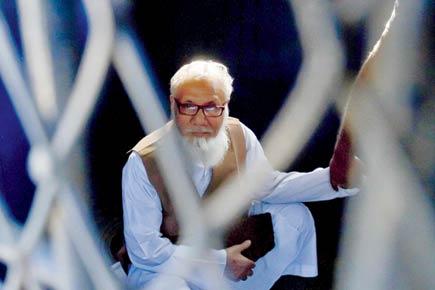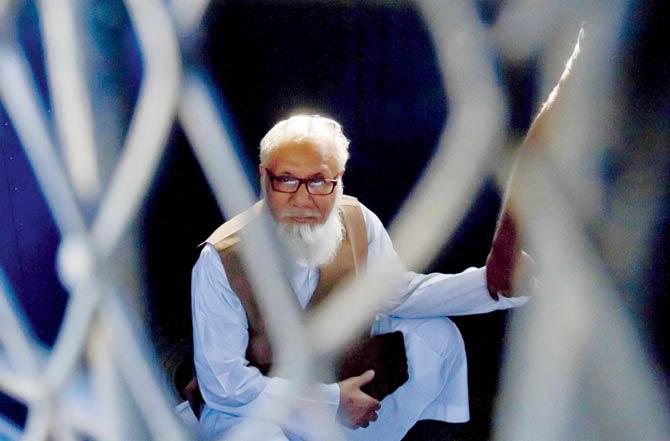Fundamentalist Jamaat-e-Islami chief Motiur Rahman Nizami could be executed anytime after the Bangladesh Supreme Court yesterday rejected a final appeal against his death sentence for war crimes committed during the 1971 Liberation War with Pakistan

Dhaka: Fundamentalist Jamaat-e-Islami chief Motiur Rahman Nizami could be executed anytime after the Bangladesh Supreme Court yesterday rejected a final appeal against his death sentence for war crimes committed during the 1971 Liberation War with Pakistan.
ADVERTISEMENT

Motiur Rahman Nizami being taken to a prison in a van. File pic/AFP
Chief Justice Surendra Kumar Sinha, who headed a four-member Appellate Division bench, pronounced the single-word judgement at the tense courtroom. “Dismissed,” said Sinha, who is the first Hindu to occupy the post in the Muslim-majority country.
The case
Nizami (72) has been convicted of murder, rape and orchestrating the killing of top intellectuals during the 1971 independence war. He was given capital punishment in October 2014 after being convicted of “superior responsibility” as the chief of the infamous Al-Badr militia forces in 1971.
Nizami was found guilty of systematic killings of more than 450 people alone in his own village home in northwestern Pabna, siding with the Pakistani troops.
Verdict day
Tight security was enforced in and around the court complex ahead of the verdict, though unlike the trial court, the apex court procedures did not require Nizami’s presence during the delivery of the judgement.
Call for strike
The Jamaat chief is now kept at a special cell for death row convicts at Kashimpur Central Jail. Immediately after the verdict, Jamaat issued a statement calling Nizami a “victim of state-sponsored conspiracy” and called a day-long nationwide strike on May 8. “The government has taken a plan to kill Maulana Nizami in the name of trial of crimes against humanity as part of its political vengeance,” the statement said.
Clemency
Nizami, who was a minister in the past BNP-led four-party alliance government with his party being its crucial ally, could be hanged anytime unless he seeks clemency from the president.
President Abdul Hamid has earlier rejected two such prayers by 1971 war crimes convicts.
 Subscribe today by clicking the link and stay updated with the latest news!" Click here!
Subscribe today by clicking the link and stay updated with the latest news!" Click here!






